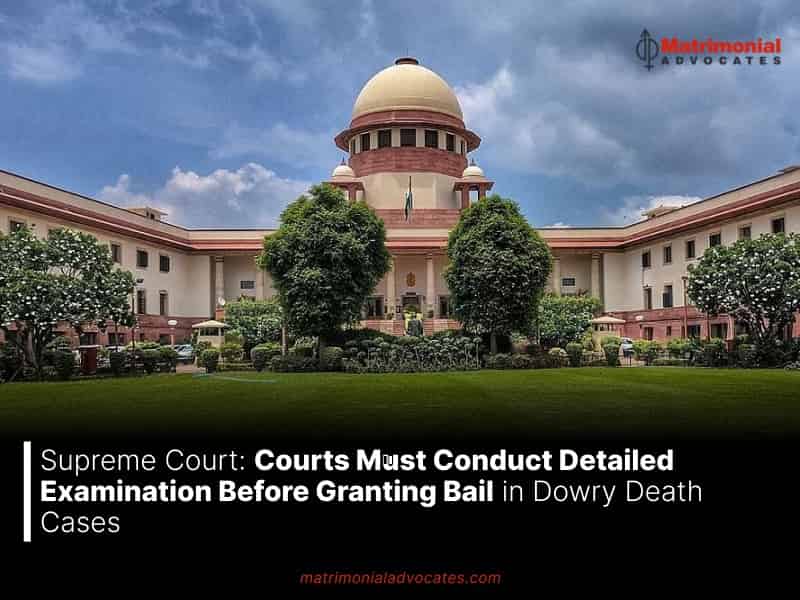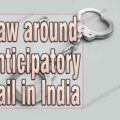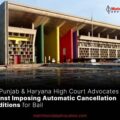
The Court said that by mechanically granting bail in such cases, courts risk normalising a crime that continues to claim numerous innocent lives.
On Monday, the Supreme Court stressed that courts must carefully assess the circumstances before granting bail in dowry death cases. [Shabeen Ahmad v. The State of Uttar Pradesh]
A bench consisting of Justices Vikram Nath and Sandeep Mehta observed that granting bail without proper scrutiny undermines the seriousness of dowry deaths and weakens public trust in the judiciary’s commitment to addressing this crime.
“It is unfortunate that in today’s society, dowry deaths remain a grave social concern, and in our opinion, the courts are dutybound to undertake deeper scrutiny of the circumstances under which bail is granted in these cases…a superficial application of bail parameters not only undermines the gravity of the offence itself but also risks weakening public faith in the judiciary’s resolve to combat the menace of dowry deaths. It is this very perception of justice, both within and outside the courtroom, that courts must safeguard, lest we risk normalizing a crime that continues to claim numerous innocent lives,” the order stated.
The Court was hearing a petition challenging four orders of the Allahabad High Court that granted bail to family members accused of involvement in the dowry death of a woman less than two years after her marriage.
The deceased, Shahida Bano, married Sami Khan in February 2022. Shortly after the wedding, her in-laws allegedly began demanding dowry. Initially, they requested a “Bullet” motorcycle, which her family provided. However, they later demanded a car, which the complainant could not afford due to financial constraints. As a result, she was reportedly subjected to continuous harassment and cruelty, according to the prosecution.
In January 2024, Shahida Bano’s father received a call from her father-in-law, urging him to visit her matrimonial home immediately. Upon arrival, her family found her hanging from a ceiling fan with a dupatta.
A post-mortem examination conducted in January 2024 revealed multiple ante-mortem injuries, including traumatic contusions on the head and neck. The cause of death was determined to be asphyxia due to ante-mortem strangulation, ruling out suicide and indicating forced strangulation.
Following the incident, the deceased’s brother lodged a complaint under Sections 498A and 304B of the Indian Penal Code, along with Sections 3 and 4 of the Dowry Prohibition Act, 1961.
Challenging the FIR, the respondents moved the District and Sessions Court, Sultanpur, seeking bail. However, their bail applications were rejected by the sessions judge.
However, the Allahabad High Court later granted bail to the respondents through separate orders. In its ruling, the High Court took into account factors such as the absence of any prior criminal record, the fact that some of the accused were women, and the bail already granted to co-accused individuals.
Challenging these orders, the appellant approached the Supreme Court, arguing that crucial evidence had been overlooked in the decision to grant bail.
The Supreme Court observed that there was a strong prima facie case against the deceased’s father-in-law and mother-in-law due to their direct involvement in harassment, dowry demands, and physical abuse.
Expressing concern over the High Court’s seemingly routine approach in granting bail, the Supreme Court noted that while the absence of prior criminal records was considered, the High Court failed to adequately assess the gravity of the allegations and the severity of the circumstances.
“We find that Accused No.2 and Accused No.3 do not deserve the continued protection of bail. The gravity of the allegations, ranging from demands for costly gifts to the infliction of brutal injuries, demonstrates a strong prima facie case against them…thus, permitting the father-in-law and mother-in-law to remain at large would run counter to the ends of justice, especially when the evidence reflects a probable nexus between their persistent dowry demands, physical cruelty, and the deceased’s death.”
As a result, the bail was revoked, and the accused were ordered to surrender immediately.
However, concerning the deceased’s sisters-in-law, the Court recognized their relatively indirect involvement and considered personal factors such as their marital status, education, and employment.
Accordingly, their bail was upheld, with the Court emphasizing that this decision should not be seen as a judgment on the merits of the allegations against them.





